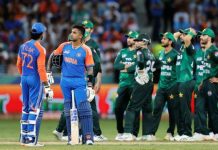US President Donald Trump, who is once again at the center of global political discourse, has signaled a likely meeting with Indian Prime Minister Narendra Modi in the coming days. In his remarks, Trump described Modi as one of his “closest friends,” a statement that marks a significant shift from his earlier, more combative approach toward India.
This change in tone is neither surprising nor entirely unexpected. While Pakistan had welcomed Trump’s previous tough line on India, it was always clear that Washington and New Delhi share structural strategic interests that are likely to override short-term irritants in their relationship. At the time, analysts in Islamabad cautioned against complacency, noting that Trump’s stance was unpredictable and subject to change. That change has now materialized.
Trump had at times taken a hard line on India, especially over trade imbalances and New Delhi’s protectionist policies. His administration briefly withdrew preferential trade benefits granted to India under the Generalized System of Preferences (GSP), accusing India of unfair treatment of American companies. On Kashmir, too, Trump surprised many by offering to mediate between India and Pakistan, a move New Delhi rejected outright.
These developments were initially welcomed in Islamabad, which saw Trump’s tougher posture as a sign that Washington might lean toward a more balanced South Asia policy. However, seasoned observers noted even then that Trump’s transactional style meant his positions were fluid. He was never one to be bound by ideological commitments; instead, he often recalibrated his stances based on personal rapport and perceived US interests.
Today’s warm rhetoric toward Modi must therefore be read in this context. Trump’s description of the Indian leader as a close friend signals not just personal chemistry but also a recognition of India’s long-term strategic value to Washington.
The evolving Trump-Modi dynamic reflects a broader reality: the United States and India are increasingly natural allies. Their partnership is anchored in shared interests, particularly in counterbalancing China’s growing influence in the Indo-Pacific. From defense cooperation to technology transfer, trade, and investment, Washington sees New Delhi as an indispensable partner in its global strategy.
This strategic alignment is unlikely to change significantly regardless of who sits in the White House. Even when Trump adopted a harsher tone, the underlying trajectory of US-India relations remained positive. Successive American administrations—Republican or Democrat—have consistently sought to deepen ties with India, recognizing its growing economic clout and strategic relevance.
For Islamabad, Trump’s latest overtures toward Modi serve as a timely reminder that Pakistan must frame its foreign policy with realism. While it is tempting to read too much into temporary rifts between Washington and New Delhi, the long-term direction of US-India ties remains steady and positive.
This does not mean Pakistan’s importance has diminished. Washington continues to recognize Islamabad’s role in regional stability, particularly in Afghanistan and counterterrorism efforts. However, the US-India partnership has its own momentum that Pakistan cannot wish away.
The prudent approach for Islamabad is to avoid emotional reactions to Trump’s shifting tone and instead focus on strengthening its own bilateral relationship with the United States on the basis of mutual interests. Pakistan’s strategic location, its role in regional peace, and its growing potential in trade, connectivity, and energy security remain relevant to American policymakers.
As Trump and Modi prepare for their likely meeting, the optics will undoubtedly emphasize personal warmth and partnership. This may disappoint some in Pakistan who had taken satisfaction in Trump’s earlier frustrations with New Delhi. But it should not come as a surprise. The US and India are bound together by structural interests that transcend personalities and political cycles.
For Pakistan, the key takeaway is not Trump’s unpredictability but the predictability of Washington’s broader approach toward India. Islamabad must continue to engage with the United States pragmatically, advancing cooperation where interests align, while also safeguarding its strategic relationship with China and deepening partnerships with other key players.
In international politics, friendships may shift, but interests endure. The Trump-Modi meeting will be another chapter in the evolving US-India story—one that Pakistan must watch closely, but without illusions.

















